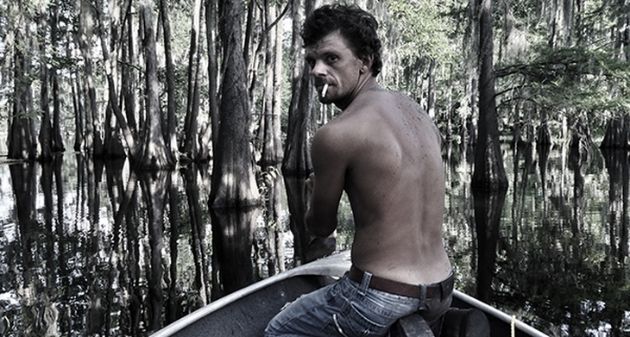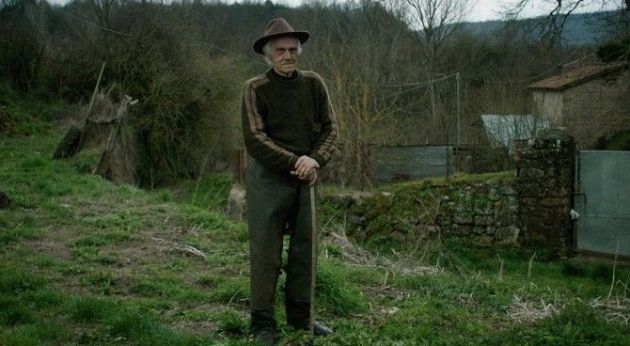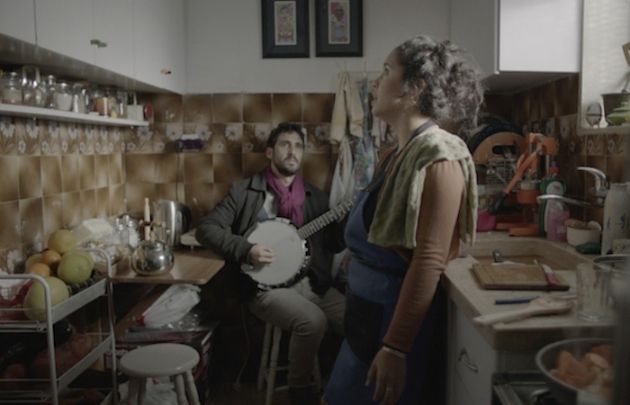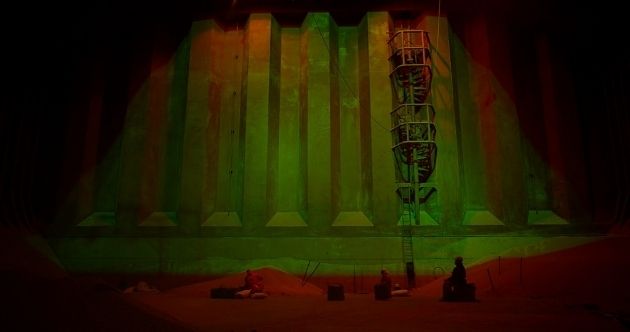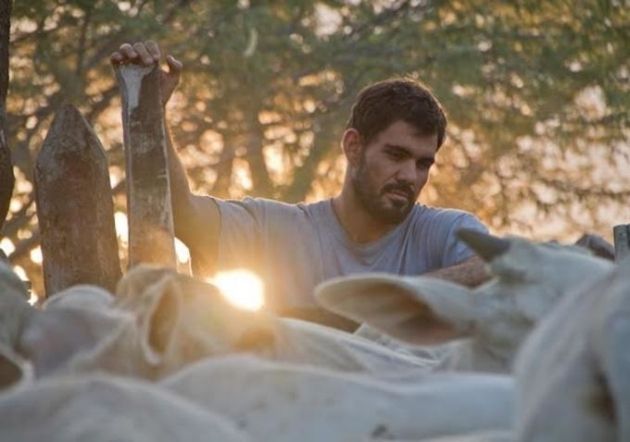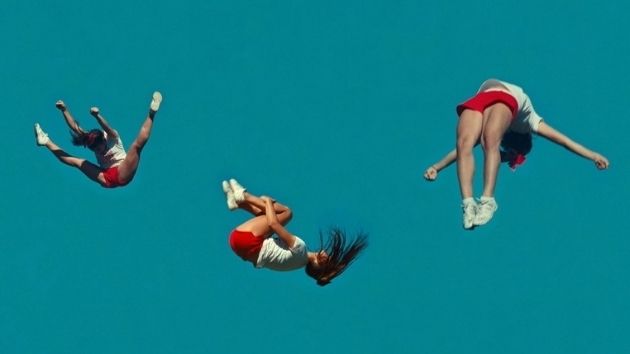
I had a chance to get a phone interview with Mascaro to discuss his first retrospective anywhere and his new film, Neon Bull.
Brazilian visual artist and filmmaker Gabriel Mascaro’s new narrative feature, Neon Bull, is garnering much critical acclaim. On the occasion of the theatrical release of the film in New York, Film Society of Lincoln Center revisits the works of one of international cinema’s most exciting new auteurs in Gabriel Mascaro: Ebbs and Flows, a five-film retrospective, starting 4/15.
Living and working in Recifé, the cultural capital of Pernambuco, a once neglected northeast region of Brazil, Mascaro established himself as an artist delving into photography, installations, documentaries and digital animation, commenting on ever so changing political, cultural, geographic landscapes. His astute observation on the lives of margins of society using non-actors in their working environs bore layered, fascinating, impossible to categorize films.
Neon Bull is the culmination of all of Mascaro’s preoccupations and his practices as an artist. It stars hunky Brazilian TV star Juliano Cazarré as a Vaqueiro (cowboy) who dreams of being a fashion designer. Gorgeously lensed by Diego Garcia (Cemetery of Splendour) and naturally acted by non professional and professional actors alike, the film observes human body at its most natural state – at work place and subverts it in the social, cultural, political context. It’s a multi-layered, sensual, deeply complex film.
Q: Congratulations on your retrospective, Gabriel Mascaro: Ebbs and Flows at the Film Society at the Lincoln Center here in New York.
A: Thank you very much. It’s the first time that my work has been shown all together. It’s a very interesting moment for me to see them all in one setting like that. I like the title Ebbs and Flows. For me it was a short (A Onda Trás o Vento Leva) that didn’t really work. It’s a happy choice of a title because I can reflect on my own work.
Q: Your discipline as a visual artist is not limited to a feature filmmaking. You’ve done shorts, documentaries, computer animation and installation work. Now you’ve done two feature length films back to back, what is it about a feature length narrative that are different than your other work? What is it that you are exploring in a narrative feature?
A: It’s a difficult question. I don’t really know exactly. But for me it’s a natural evolution. I came to make narrative features after getting into discussions about negotiating images in making documentaries. For me, documentaries are like auto-fictions…I don’t know how to translate this, but it’s the real people telling fictional stories about themselves, like a self-made fiction. In a way I wanted to deepen that experience.
Working with experienced actors in Neon Bull was a very different experience. It was a challenge because I’ve never really worked with experienced actors before. There was a change in my approach. But interestingly, one of my favorite moments was when Cacá (Aline Santana, an 8-year old who’s never acted before) became quiet in the film. The silent moments were the time when she was actually discovering herself and building her character. It was a magical moment in directing because she’s not an experienced actress. I told Aline to only speak when it’s necessary and assured her that there is no hurry, that filming can wait. That she should speak only if she believed in what she was saying, that she should take a deep breath and speak when only necessary. So it’s a film where characters only speak when they want to, when they have a desire to speak.
Q: On that note, I was wondering about your writing process. Did you have a tightly written script for both August Winds and Neon Bull? Or is your filmmaking more of an organic process where improvisation is necessary?
A: It’s an interesting question. I do work with a structured screenplay- the traditional one with dialog. But what’s different is the process of preparation with the actors.
In case of Neon Bull, the actors all read the script and they spent two months of preparation where they didn’t use the script anymore. They were working more on the dynamic of interactions. They did exercises with the dialog from the script but they weren’t rehearsing the dialog.
Before shooting the scenes in Neon Bull, I’d read out loud the dialog to the actors. And they would try to recover the structure of the script but they would still use the dynamic that they had developed during those two month of preparation. It brought them to a special place because these mixture of two approaches.
Q: That’s very interesting. How did Juliano Cazarré (who plays the main character, Iremar) take the script when he first read it?
I think Juliano was very intrigued and happy because the script gave him the opportunity to change the image that people have of him and the role they usually associate with him - strong, tough, macho type. And with this character, he shows his sweet and sensitive side.
He was worried about the sex scene, because he realized that it was a very strong scene. But he was very nervous and insecure about doing it. It was a challenge. But they figured it out.
The process for preparing the roles was that of a…gradual deduction: shedding the typical element of their supposed characters. They were entering it and giving themselves slowly to the process.
Q: There are a lot of interesting contradictions in Neon Bull. Iremar is a big handsome cowboy but he wants to be a fashion designer and two girls - Galega and Geise are a tough truck driver and an armed security guard. Was this sexual politics something you were interested in exploring?
I think the film is about the process of transformation, transforming bodies. Economically the transformation is very accelerated in Brazil. To project these bodies to the landscape without the typical gender roles and to contextualize them in the cowboy universe was something I was interested in.
It’s not just about inverting gender roles, its about bodies that are working in different scale - the opposites of pleasure and violence, sensibility and anger, it’s all about all these things together. It’s not about masculine woman and feminine man but we are talking about more abstract categories.
Q: What’s also interesting is that Housemaids, August Winds and Neon Bull all feature working people doing manual labor. Can you elaborate on that aspect of your films?
A: It’s a great question. No one asked me that before. I do research on bodies that are contextualized in the world of work. So in some ways, my work is a gesture in trying to explore the common subject. I guess the larger meaning in my work is to try to find extraordinary experiences in ordinary work.
Their occupation, their work that I show in these films often shows impersonalized faces and movements in repetition. So these films are subversion of the work itself. For example in August Winds, they have sex in the coconut cart during their break where they work and in Neon Bull, he makes fashion out of fallen tails of the bulls. So in a way it’s imagining the work in a more personal way. I am trying to elaborate the intervals of this kind of work with an eruption of the body in a more abstract sense as well- a warm and affectionate form of a body in impersonal places.
Q: Can you tell me about Pernambuco, the northeast region of Brazil in context to your films?
A: The region is often associated with poverty and hunger and people wanting to escape. I spent my whole life there and never left nor I wanted to. So I tried to build my work there. With the characters in my films, I try to discuss how to redefine this place. They are there in the northeast and they don’t want to leave.
The way these characters are written, they are not the ones you feel sorry for. They might have simple lives but they are strong people and they are not naive. Though in some ways, Neon Bull deals with the economic transformation that is happening in the region and it shows a lot of challenges that people are facing there, but I think a lot of it is universal - like gentrification, industrialization, large scale construction everywhere.
Q: What is your assessment of the recent surge in Brazilian cinema? I’ve seen some really interesting films produced in recent years. Adirley Queirós’ White Out, Black In and Kleber Mendonça Filho’s Neighboring Sounds, just give you couple of examples…
A: We are speaking of very special moment in Brazilian cinema. Many filmmakers who are working are more interested in developing a new language of film. They don’t have the pressure of the market so much. They are modest budget films but they all have one thing in common - they are all supported by the government funds. So they are able to elaborate their language of film without making any concessions.
The filmmakers you mentioned, Adirley Queirós and Kleber Mendonça Filho are doing very interesting films. Filho also has a new film out called Aquarius, and it will be a special and important film for Brazilian filmmaking.
**Special thanks to Austin Kennedy at FSLC for arranging the interview and Micheal Gibbons for translation
